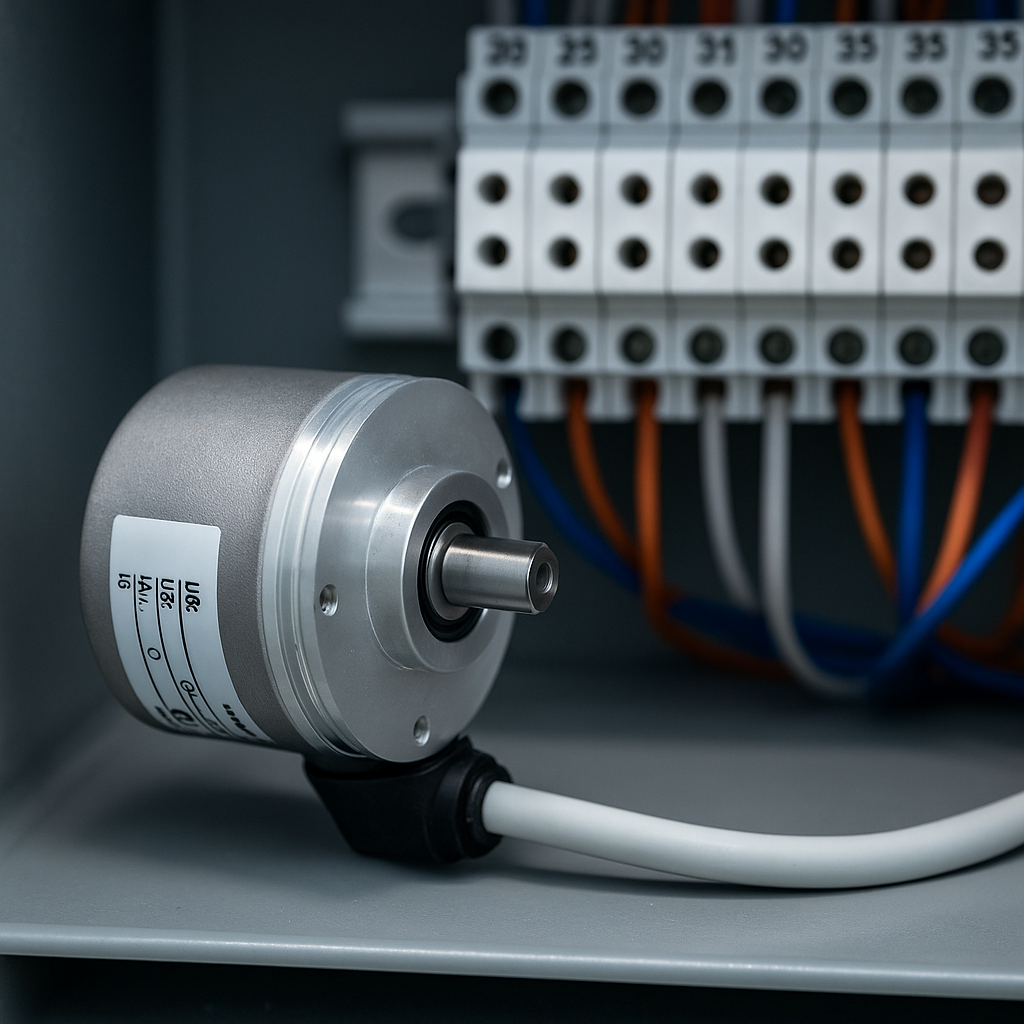
Posted on Tuesday, November 18, 2025
Encoders are one of the most critical components in any roll forming machine. They control length measurement, flying saw positioning, punch timing, feed speed, servo alignment, and production accuracy. When an encoder becomes miscalibrated — even slightly — your entire production process can drift out of tolerance.
Signs of encoder miscalibration include:
Wrong panel length
Inconsistent cut accuracy
Punch out of sync
Flying saw missing the cut
Jerky servo movement
PLC showing unstable speed readings
Motor struggling to follow commands
Encoder “pulse loss” or “direction error”
This blog explains why encoders drift, how recalibration works, early warning signs, preventive maintenance, and how Machine Matcher technicians recalibrate encoders for peak accuracy.
Encoders convert mechanical motion into an electrical pulse signal. The PLC and servo drives use these pulses to control:
Feed speed
Cut length
Punch timing
Flying saw travel
Line synchronization
Motor speed precision
1 pulse out of place = a length error.
100 pulses out of place = a production disaster.
A properly calibrated encoder ensures:
Accurate panels
Reduced scrap
Faster cycle times
Stable servo performance
Reliable VFD feedback
Safe flying saw synchronization
Without calibration, production slowly drifts until major failures occur.
Encoders do not stay perfect forever. Several factors cause drift:
Loose encoder couplings
Slipping encoder wheel
Worn bearings
Shaft misalignment
Dirty or slipping timing belts
Worn measuring wheel (on friction encoders)
Noise from VFDs
Poor grounding
Incorrect shield termination
Weak 24VDC supply
Broken encoder wire strands
Bad A/B/Z channel connections
Wrong PPR (pulses per revolution)
Incorrect scaling factor
Wrong gear ratio
Incorrect servo tuning
PLC misconfiguration
VFD speed scaling errors
Metal dust
Oil contamination
Vibration
Heat or humidity
Encoders only work as well as their environment allows.
The most common symptom.
Panels become too long, too short, or vary dramatically between cuts.
Saw arrives too early
Saw arrives too late
Cut happens at wrong position
Actual cut drifts as speed increases
Punch fires at wrong moment due to inaccurate feedback.
Servo triggers:
Following error
Overspeed
Oscillation
Jitter
Axis fault
PLC or HMI shows unstable speed when line is running at a constant rate.
Machine Matcher uses a step-by-step process to recalibrate encoders.
Check:
Encoder coupling
Shaft alignment
Belt tension
Measuring wheel pressure
Encoder bracket rigidity
Cable condition
Fixing mechanics FIRST is critical — software cannot compensate for mechanical defects.
Remove metal dust
Check LED indicators
Measure output pulses with oscilloscope or PLC monitor
Verify power supply voltage
Check A/B/Z channels for equal amplitude
We verify:
PPR (pulses per revolution)
Voltage type (5V TTL / 24V open collector / differential)
Wiring configuration
Direction
Incorrect PPR or direction causes major cut-length errors.
In the PLC or servo drive, we adjust:
Scaling factor
Encoder distance per pulse
Gear ratio
Flying saw sync factor
Punch timing offset
Shear calibration curve
This creates accurate, repeatable manufacturing.
We run tests at:
Slow speed
Medium speed
Maximum line speed
Mis-calibration often appears ONLY at high speed due to inertia and encoder lag.
The final calibration values are saved in:
PLC program
Servo drive parameter backup
VFD memory
Maintenance record
This ensures settings can be restored if a module fails.
Most encoder failures are preventable.
Prone to:
Slippage
Misaligned shafts
Prone to:
Dirt buildup
Worn rubber wheels
Inconsistent contact pressure
Prone to:
Metal dust interference
Prone to:
Servo tuning drift
Heat damage
Connector vibration
Machine Matcher technicians handle all encoder types.
Contact a professional if you experience:
Wrong panel length
Inconsistent cut accuracy
Flying saw crashing or mis-timing
Punching out of sync
Encoder pulse loss
Servo following errors
High-speed drift only at certain speeds
Length errors after mechanical changes
Machine Matcher provides:
Encoder recalibration
Encoder replacement
Mechanical alignment correction
PLC scaling adjustments
Servo tuning
VFD synchronization
24/7 remote support
Worldwide on-site technicians
Encoder recalibration is one of the most important maintenance tasks for any roll forming machine. If the encoder drifts, the entire production process becomes inaccurate — leading to scrap, downtime, and customer complaints.
Routine encoder inspection and recalibration protect cut accuracy, flying saw timing, servo stability, and overall production efficiency.
Machine Matcher provides complete encoder services, from diagnostics to recalibration to replacement, ensuring your machines stay accurate and reliable worldwide.
Machine Matcher now offers full electrical technician services for roll forming machines — including diagnostics, rewiring, testing, encoder calibration, PLC programming, electrical audits, and preventive maintenance.
We support all machine types and all global regions.
Contact us today for immediate technical assistance or to schedule a full electrical inspection at your factory.
Looking for the right roll forming machine or expert guidance on your next project? Machine Matcher is here to help. Our global team provides 24/7 technical support, expert advice, and guidance on machine selection, setup, and maintenance—ensuring your operations run smoothly from day one.
With team members based worldwide—including the UK, USA, Middle East, and beyond—we are equipped to assist buyers across the globe. Whether you’re sourcing a single machine or upgrading an entire production line, our experts are ready to provide tailored solutions and support every step of the way.
Get in touch now and let Machine Matcher help you find the perfect roll forming machine for your business.
United Kingdom (Main Office)
Phone: +44 20 335 56554
United States
Phone: +1 407 559 7948
Mobile / WhatsApp: +44 7816 972935
Email: [email protected]

Used Purlin Roll Forming Machines for Sale Worldwide
Posted on Sunday, January 25, 2026
Pre-Owned Roll Forming Machines for Purlin & Structural Steel Profiles

Used Roof Panel Roll Forming Machines for Sale Worldwide
Posted on Sunday, January 25, 2026
Pre-Owned Roll Forming Machines for Roofing Panel Production

Used Roll Forming Machines for Sale Worldwide
Posted on Tuesday, January 20, 2026
Pre-Owned Roll Forming Machines with Inspection, Verification & Global Support

Steel Coil Supply for Roll Forming Machines Worldwide
Posted on Tuesday, January 20, 2026
Reliable Steel Coil Supply for Roll Forming, Fabrication & Manufacturing Applications
Copyright 2026 © Machine Matcher.